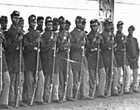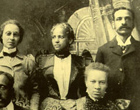Abolitionists, black and white, sincerely sought the end to slavery and accepted its geographical limitation as a step toward its inevitable demise. But although most whites in the North wanted to restrict slavery's spread, they would not have gone to war in 1861 to end it. President Lincoln understood his constituency very well and his statements on slavery were calculated to reassure white northerners as well as southern slaveholders that the U.S. government had, in his words, "no purpose, directly or indirectly, to interfere with slavery in the States where it exists." Indeed, Lincoln even reluctantly agreed to accept an amendment to the U.S. Constitution that would have protected slavery in those states where it existed. Ohio, Maryland, and Illinois actually ratified this measure that, ironically, would have been the 13th Amendment. Although this may have played well among northerners who were willing to concede protection to slavery so long as it remained in the South, slaveholders understood only too well it was not that simple.
Since most Americans saw the West as the place that would provide the vitality of national progress, to deny slaveholders access to that territory was to deny them access to America's future. Southerners took such restrictions as a direct affront to their regional honor and a threat to their social and economic survival. Georgia secessionist Robert Toombs put it succinctly: "we must expand or perish." Lincoln did not have to explain that slavery had no place in the nation's future, the South was well aware that in order to save their institution of bondage they must leave the United States and that is precisely what their secession movement was calculated to do.
Thus, while northerners claimed that they meant only to restrict slavery's expansion, southerners were convinced that to restrict slavery was to constrict its life blood. This war was not about tariffs or differences in economic systems or even about state's rights, except for the right of southern states to protect slavery. It was not willing to stand for state's rights except to preserve its institution of slavery where it existed and where it must expand. Some southerners had argued in the 1850s for the annexation of Cuba, one of only two other remaining slave societies in the western hemisphere, as one plan for slavery's expansion. Others looked to Mexico and Latin America, but always it was about saving and expanding slavery. And while the U.S. government may not have gone to war to abolish slavery in the South, it did go to war to save the union from what it increasingly came to believe was a "slave power conspiracy" to restrict citizen liberties and finally to destroy the United States. The northern determination to contain slavery in the South and to prevent its spread into the western territories was a part of the effort to preserve civil rights and free labor in the nation's future. The South was willing to destroy the union to protect slavery.





